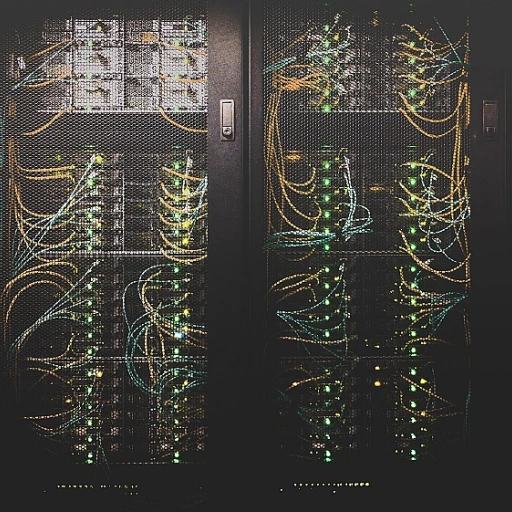
The Rise of Think Tank Initiatives in Software
The Emergence of Think Tanks in the Software Arena
In recent years, think tank initiatives have gained significant traction in the software industry. These organizations, often based at universities or independent institutes, are playing a pivotal role in shaping the future of software development. Their work spans across various domains, including public policy, economic social issues, and international development. By leveraging their expertise, think tanks are influencing policy making and driving innovation in specific areas of software development.
Think tanks operate as bridges between academia, industry, and government, providing a platform for collaboration and professional development. They engage in policy influence by conducting research, hosting forums, and publishing reports that address key challenges in the software sector. This engagement is crucial for addressing long-term policy issues and fostering an open society where technology can thrive.
In the United States and beyond, think tanks are increasingly recognized for their contributions to the software industry. Their initiatives are not limited to national borders; they often have a global reach, impacting policy engagement and economic development in regions such as South Asia. By focusing on both economic and social aspects, think tanks are helping to create a more sustainable and inclusive future for software.
For those interested in exploring the broader implications of think tank initiatives in marketing technology, you might find this exploration of big bold bets in marketing technology insightful.
Key Challenges in Software Development
Understanding the Complex Landscape of Software Development
In the ever-evolving world of software development, several key challenges persist that require attention from both industry leaders and think tank initiatives. As technology advances, the complexity of software systems increases, leading to a host of issues that need strategic solutions.
Addressing Technical and Economic Challenges
One of the primary challenges in software development is the rapid pace of technological change. Developers must constantly update their skills to keep up with new programming languages, frameworks, and tools. This need for continuous professional development can be overwhelming, especially in regions like South Asia where access to resources may be limited. Additionally, economic factors play a significant role. The cost of development and deployment can be prohibitive, particularly for startups and small enterprises. Think tanks can provide valuable insights into cost-effective strategies and economic social policies that support sustainable growth.
Policy and Regulatory Hurdles
Policy and regulation are also critical areas where challenges arise. In the United States and internationally, software development is often subject to complex regulatory environments. Navigating these regulations requires a deep understanding of public policy and policy making processes. Think tanks and policy engagement initiatives can offer guidance on how to align development practices with legal requirements, ensuring compliance and fostering innovation.
Social and Public Interest Considerations
Beyond technical and regulatory issues, software development must also consider social and public interest factors. The impact of software on civil society and open society initiatives cannot be overlooked. Developers must be mindful of the social media landscape and the potential for their products to influence public discourse. Think tanks can play a pivotal role in shaping software that is socially responsible and aligned with public interest goals.
For businesses navigating these challenges, adapting to the software-driven future is crucial. Understanding the importance of adaptation can help organizations thrive in this dynamic environment.
Innovative Solutions from Think Tanks
Innovative Contributions from Think Tanks
Think tanks have become pivotal in driving innovation within the software industry. These organizations, often associated with universities or independent institutes, are increasingly focusing on specific areas of software development to address pressing challenges. By leveraging their expertise in public policy and economic social issues, think tanks are crafting solutions that not only enhance technological capabilities but also align with societal needs.
One of the key contributions of think tanks is their ability to foster professional development through specialized programs. These initiatives often involve collaborations with industry leaders, allowing for a cross-pollination of ideas and strategies. For instance, think tanks in the United States and South Asia are actively engaging in policy influence to ensure that software development aligns with international development goals.
Moreover, think tanks are instrumental in policy engagement, working closely with government bodies and civil society to shape regulations that support innovation while safeguarding public interests. This collaboration is crucial in navigating the complex landscape of policy making, where economic and social considerations must be balanced.
In the realm of social media and global communication, think tanks are exploring how software can be leveraged to enhance public discourse and open society initiatives. By addressing policy issues through a technological lens, they are helping to create platforms that facilitate more inclusive and informed discussions.
For those interested in the intersection of technology and policy, exploring the top AI copilot interviews of 2025 offers insights into how think tanks are influencing the future of software development. These interviews highlight the innovative approaches being adopted to tackle long-term challenges in the industry.
Collaboration Between Think Tanks and Industry Leaders
Building Bridges Between Think Tanks and Industry
The collaboration between think tanks and industry leaders is becoming increasingly vital in shaping the future of software development. As think tank initiatives continue to rise, their role in bridging the gap between theoretical research and practical application is more crucial than ever. These collaborations help in addressing complex policy issues and fostering economic and social development.
Think tanks, often associated with universities and research institutes, provide a platform for professional development and policy engagement. By working closely with industry leaders, they can influence public policy and drive innovation in specific areas of software development. This partnership is not just beneficial for the think tanks but also for the industries that gain access to cutting-edge research and policy insights.
Mutual Benefits and Long-Term Impact
Industry leaders benefit from the strategic insights provided by think tanks, which are based on comprehensive research and analysis. These insights can guide companies in navigating complex regulatory environments and adapting to international development trends. In return, think tanks gain real-world data and feedback, which enhances their research and policy-making capabilities.
Moreover, this collaboration fosters an open society where ideas and innovations can be shared freely, leading to a more dynamic and responsive software industry. By engaging with think tanks, companies can also address special interest areas and contribute to global initiatives aimed at sustainable development.
Challenges and Opportunities
Despite the benefits, there are challenges in aligning the goals of think tanks and industry leaders. Differences in priorities and timelines can sometimes hinder effective collaboration. However, with clear communication and shared objectives, these challenges can be overcome, leading to successful partnerships that drive both economic and social progress.
As the software industry continues to evolve, the role of think tanks in providing policy influence and leadership will only grow. By fostering collaboration with industry leaders, think tanks can ensure that their research and initiatives have a lasting impact on the global software landscape.
The Role of Policy and Regulation
Policy Influence and Regulation
As the software landscape evolves, the role of policy and regulation becomes increasingly significant. Think tanks are pivotal in shaping these frameworks, offering insights that guide policy making and ensure that regulations keep pace with technological advancements. These organizations often collaborate with government bodies and international institutions to address policy issues that impact the software industry.
Think tanks engage in policy influence by conducting research and providing recommendations on specific areas such as data privacy, cybersecurity, and intellectual property rights. Their work is crucial in balancing the interests of economic development and public policy, ensuring that innovation does not come at the expense of social and ethical considerations.
Engagement with Civil Society
Beyond influencing policy, think tanks play a vital role in engaging with civil society. They facilitate discussions between industry leaders, policymakers, and the public to foster a more inclusive approach to software development. This engagement is essential for addressing the concerns of various stakeholders and promoting transparency in policy making.
Initiatives like the open society programs and international development projects spearheaded by think tanks help bridge the gap between technology and society. By working closely with universities and research institutes, these organizations contribute to professional development and the dissemination of knowledge across borders.
Long-term Impact and Global Collaboration
The long-term impact of think tank initiatives is evident in their ability to shape global policy frameworks. By fostering international collaboration, these organizations ensure that software development aligns with global standards and addresses the needs of diverse markets. In regions like South Asia, think tanks are instrumental in promoting economic and social development through targeted policy engagement.
In conclusion, the collaboration between think tanks and policy makers is crucial for navigating the complex landscape of software development. By addressing policy issues and engaging with civil society, these organizations play a key role in shaping the future of software on a global scale.
Future Trends and Predictions
Emerging Trends in Software Development
The future of software development is being shaped by a variety of factors, with think tank initiatives playing a crucial role in identifying and addressing key trends. As we look ahead, several emerging trends are poised to redefine the landscape.
- Artificial Intelligence and Machine Learning: AI and ML continue to revolutionize software development, offering new capabilities for automation and data analysis. Think tanks are exploring how these technologies can be integrated into existing systems to enhance efficiency and innovation.
- Cloud Computing and Edge Computing: The shift towards cloud-based solutions is accelerating, with edge computing gaining traction for its ability to process data closer to the source. This trend is being closely monitored by think tanks, which are assessing its impact on global and economic development.
- Cybersecurity: As software becomes more integral to our daily lives, the importance of robust cybersecurity measures cannot be overstated. Think tanks are working with industry leaders to develop strategies that address the growing threat landscape.
- Open Source Collaboration: The open source movement is fostering greater collaboration and innovation. Think tanks are examining how open source initiatives can drive economic and social progress, particularly in specific areas like public policy and international development.
Influence of Policy and Regulation
Policy and regulation are critical components in shaping the future of software. Think tanks are actively engaged in policy making, providing insights and recommendations to ensure that regulations support innovation while protecting public interests. In the United States and beyond, these initiatives are influencing policy engagement and addressing policy issues that impact the software industry.
Through collaboration with civil society and international organizations, think tanks are advocating for policies that promote professional development and economic social growth. Their work is essential in navigating the complex landscape of policy influence and ensuring that software development aligns with broader societal goals.
Long-term Predictions and Global Impact
Looking to the future, think tanks are making long-term predictions about the global impact of software development. They are considering how initiatives in South Asia and other regions can contribute to a more open society and drive international development. By fostering leadership and innovation, think tanks are helping to shape a future where software plays a pivotal role in addressing global challenges.
As we continue to explore the role of think tank initiatives in shaping software's future, it is clear that their influence extends beyond technology. By addressing economic, social, and public policy issues, think tanks are paving the way for a more connected and sustainable world.





-large-teaser.webp)









